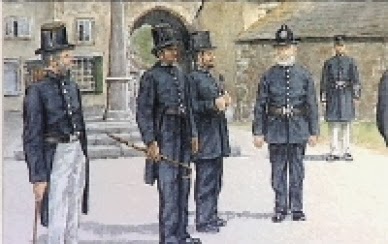
However PC John Kent beat his record, as the son of a Caribbean slave who joined the police force in 1837.
John Kent’s father, Thomas Kent, was brought to work on the estate of a Cumberland landowner returning from duty with the colonial civil service in the West Indies. His son was PC John Kent, who worked in Carlisle from 1837.
The surname Thomas adopted was in recognition of the county where he landed late in the 18th century. John was born near Carlisle around 1795.
A black figure was a rare sight in that corner of north-west England at the time and even before he joined the police Mr Kent would attract crowds as he worked laying pavements for the city corporation.
Constabularies were formally established in 1835 by the Home Secretary of the day, Robert Peel, although Carlisle had already had a unit of around 20 officers paid through public subscription for 10 years.
Bob Lowther, a former detective superintendent who has researched the history of the old Carlisle City Constabulary, traced Mr Kent through police records. He first appears as a, “supernumerary constable” or probationer, joining on 17 August 1837. He was made a permanent constable on 26 October.
In 1841, he was in the thick of the action when a constable was murdered by a blow to the head as an election crowd got out of hand in the city centre and overwhelmed the Chief Constable and about eight of his officers. It is recorded that PC Kent gave evidence against the accused at Carlisle Assizes.
Known across the city as “Black Kent”, he was clearly a valuable member of the force. His obituaries tell how he was so well known that a generation of Carlisle children were brought up to fear him.
The National Black Police Association (NBPA) attaches huge significance to the discovery of his career, which it says is totally unexpected.
“The significance is that while we had people of colour joining that far back, it took until 2003 before we had the first black chief constable [Kent’s Mike Fuller],” said David McFarlane, NBPA’s national co-ordinator. PC Kent’s career did not end on the same high note as Detective Sergeant Roberts, who received the Queen’s Police Medal for his 30 years of service.
He was sacked after just seven years with the Carlisle constabulary for being drunk on duty – a common occurrence among officers at the time. A lack of clean drinking water in the city is often blamed for excessive beer consumption. The young officer was duly disciplined and his services were dispensed with on 12 December 1844.
